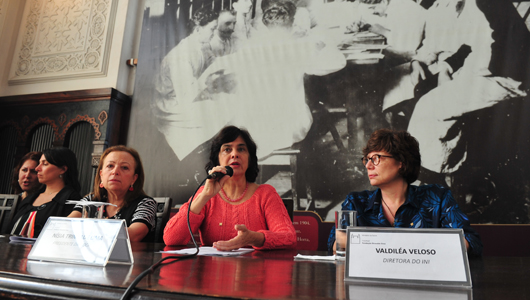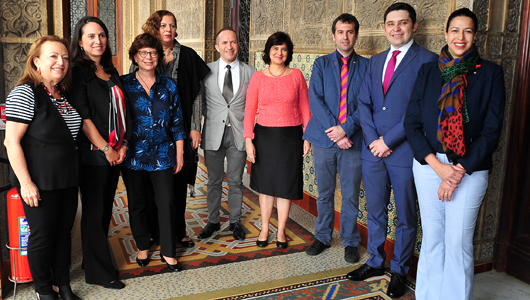Fiocruz launches HIV prevention project in Latin America
28/07/2017
Juana Portugal (INI/Fiocruz)
The HIV Pre-Exposure Prophylaxis (ImPrEP) project in Brazil, Mexico and Peru, was officially launched with a ceremony held on July 12 at the Oswaldo Cruz Foundation campus in Rio de Janeiro. Coordinated by the National Institute of Infectology Evandro Chagas (INI/Fiocruz), the project aims to contribute to the implementation of Pre-Exposure Prophylaxis (PrEP) as a strategy for HIV prevention in the three countries, focusing on population groups most exposed to the virus. The Ministry of Health, through the Department of Surveillance, Prevention and Control of STIs, HIV/AIDS and Viral Hepatitis, will support the project by providing all inputs, tests and medicines.
During the launching ceremony, the president of Fiocruz, Nísia Trindade Lima, stressed the need to involve the population in the production of knowledge. “Our mission is to generate scientific knowledge, but it is our value and direction that this knowledge is translated into welfare, products and public policies that guarantee access," said Nísia, emphasizing the importance of education, information and communication practices, and collective construction of knowledge. "We need to think about ways to strengthen the vision of combined prevention and health promotion with the vulnerable population and health professionals. This knowledge must be built together with the population, which is no longer only an object of research, becoming an active agent of health research and promotion instead," she added.

Valdiléa Veloso, the director of INI/Fiocruz and lead researcher of the project, emphasized that the initiative is the result of a collective construction, and highlighted the collaboration of civil society. “For us, science does not come from researchers to society. It is a joint construction of knowledge, and it is within that conception that we will conduct the project," she said. "The partnership with the Ministry of Health has been a great satisfaction. We have contributed with data so that PrEP is adopted as a prevention strategy in Brazil, and now we will follow its implementation as a public policy, monitoring and improving the process while it happens," she said.
The director of the Department of Surveillance, Prevention and Control of STIs, HIV/AIDS and Viral Hepatitis of the Ministry of Health, Adele Benzaken, stressed that the project will provide evidence on the opportunities and difficulties of implementing PrEP. “We are happy with this partnership. We will have answers that will help realigning the strategies of implementation of PrEP", he said.
Heather Ingold, Unitaid, an international organization based in Geneva, recalled that there are currently two million people living with HIV in Latin America, and approximately 100,000 new infections occur each year. "Our partnership seeks to find new ways to reduce the number of transmissions in participating countries, and to find out the best way to use PrEP. The project we launched contemplates Unitaid strategic objectives for innovation, access and distribution by risk groups of access to new health products," she emphasized.
Giovanni Ravasi, representative of the Pan American Health Organization (PAHO/WHO) in Brazil, said that HIV prevention is a priority in Latin America and worldwide. “In recent years we have seen significant progress in access to medicines, treatments and health services for people living with HIV but at the same time the region continues to have a fairly high number of new infections," he said. “WHO and Unaids (United Nations program) aim to end the AIDS epidemic. Investing and innovating in prevention strategies is extremely important. One of the axes of the project is to generate evidence for models of prevention services combined with strong community participation. It will certainly be a very useful experience for innovation in public policies of the countries in the region," he said.

Edgardo Ramírez, researcher from Clínica Especializada Condesa (Mexico), explained that National Program for the Fight against HIV in Mexico follows the model and monitors the advances made by Brazil in the last decades. "We are learning a lot with all the Brazilian experience accumulated over the years, and we are now happy to be able to implement a strategy that has proven effective for theses populations most affected by HIV, especially in men who have sex with men and in transgender women," he said.
Carlos Cáceres, director of Centro de Investigación Interdisciplinaria en Sexualidad, Sida y Sociedad/CIISSS (Universidad Peruana Cayetano Heredia/Peru), considers it an excellent opportunity to work together on such an important study for the three countries in the region, this is an important opportunity to build a unique knowledge for the entire Latin America, and in the future it may help in its implementation in other developing countries. "For us in Peru, the opportunity to implement ImPrEP means to practice effectively and fully the combined prevention of HIV, and this represents a huge step forward in our country, since we are still very much in the theoretical part of this process," he concluded.
ImPrEP
Funded by Unitaid and supported by Fundação Fiocruz para o Desenvolvimento Científico e Tecnológico em Saúde (Fiotec), ImPrEP will last for three years and should benefit a total of 7,500 people, and will be carried out by a consortium made up of research centers and Ministries of Health of the three participating countries. In addition to offering access to PreP, the project will also expand the diagnosis of Hepatitis B and C, Syphilis, HIV and other sexually transmitted diseases.
Instituto Nacional de Infectologia Evandro Chagas (INI/Fiocruz) is responsible for the general coordination. In Brazil, the project will initially benefit three thousand Brazilians in eight states (Amazonas, Pernambuco, Bahia, São Paulo, Rio de Janeiro, Paraná, Santa Catarina and Rio Grande do Sul). "Our goal is to have a service in each state distributing PrEP by the end of the first year. We will follow the implementation of the strategy as public health policy as it happens, monitoring and adjusting what is needed. It's something unheard of," project coordinator Valdiléa Veloso said.
In Mexico, the coordination will be of Centro de Prevenção e Atenção Integral do HIV/AIDS [Center for Prevention and Comprehensive Care of HIV/AIDS] of Clínica Especializada Condesa and will have the participation of five cities (Mexico City, Guadalajara, Puerto Vallarta, Oaxaca and Juchitan). In Peru, the project is in charge of Centro de Investigación Interdisciplinaria en Sexualidad, Sida y Sociedad/CIISSS (Universidad Peruana Cayetano Heredia/Peru) and will be present in six cities (Lima/Callao - provinces that account for 71% of AIDS cases in the country -, Iquitos, Pucallpa, Tarapoto, Chiclayo and Trujillo).
PrEP
Pre-Exposure Prophylaxis (PrEP) is a prevention strategy that consists of the daily use of a drug that acts as a "chemical barrier" against HIV virus. PrEP is part of the combined strategy, that is, those who adopt PrEP should not give up the use of condoms. Brazil pioneered Latin America by adopting PrEP as a health policy this year, on May 29.


